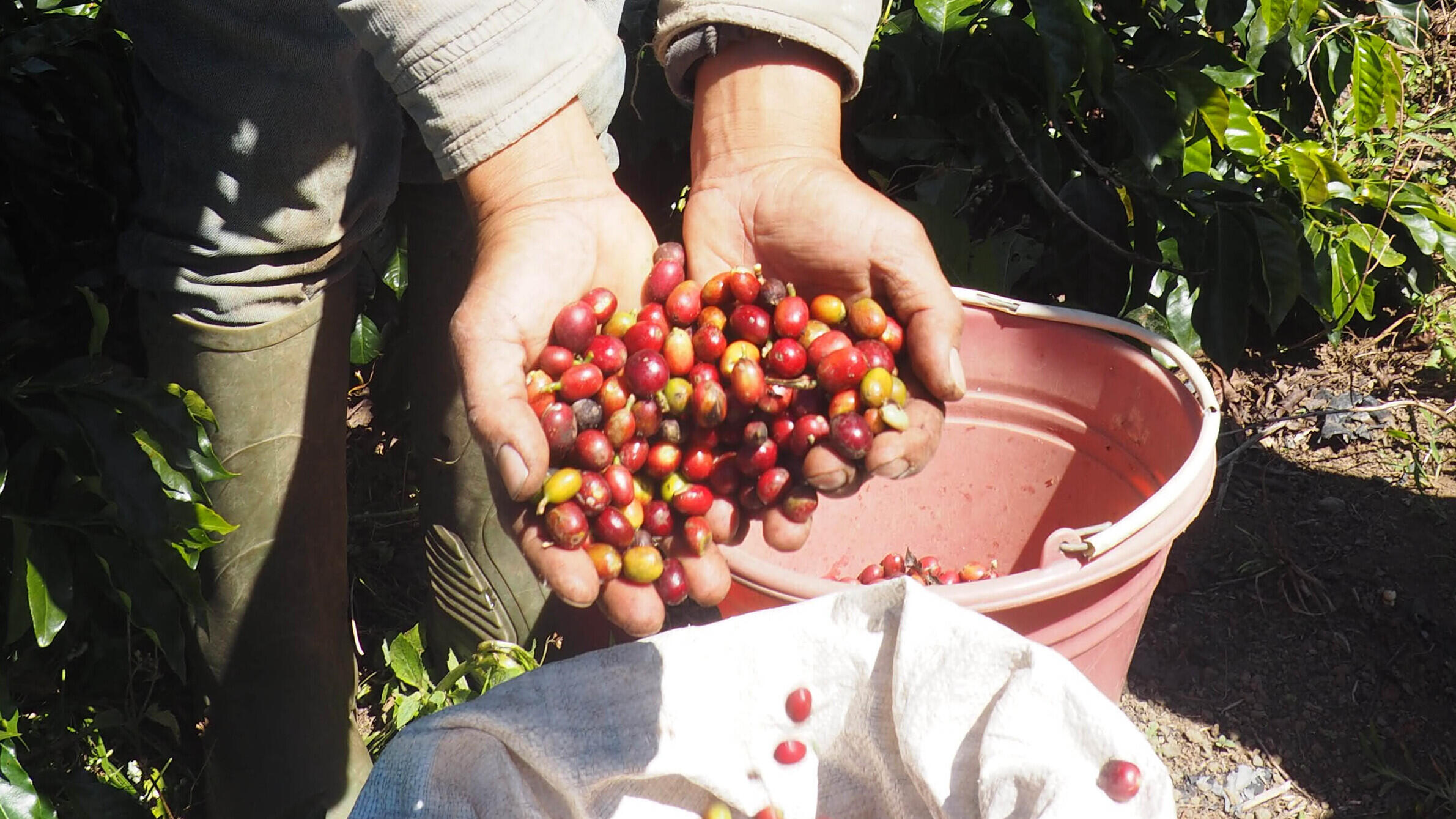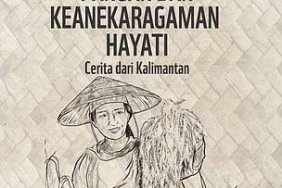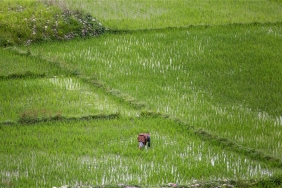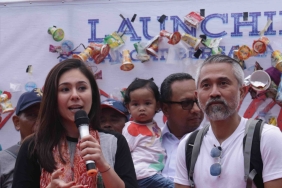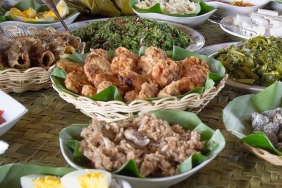CHOOSE LOCAL HARVEST FOR BIODIVERSITY, FOOD SECURITY, HEALTH AND COMMUNITY WELL-BEING
Jakarta, May 22, 2019 -- Five organizations, Hivos, WWF-Indonesia, NTFP-EP, ASPPUK and AMAN, which are members of the project consortium "Local Harvest: Promoting sustainable and equitable consumption and local food systems in Indonesia" inaugurated the launch of the "Pangan Bijak Nusantara" campaign in Jakarta, to coincide with International Biodiversity Day which is celebrated on May 22, 2019.
This public, multi-year campaign is expected to drive a significant shift in food consumption towards the consumption of ethically and sustainably sourced food products, by increasing consumer knowledge and awareness of the impact of their food choices. Charles-Michel Geurts, Chargé d'Affaires of the European Union Delegation to Indonesia, added "The European Union as the financial supporter of the project "Local Harvest: Promoting sustainable and equitable consumption and local food systems in Indonesia" supports sustainable food consumption as one of the objectives of the EU SWITCH Asia II program.
The seven commodities highlighted in the Wise Foodways of the Archipelago campaign are just a few examples of the traditional food production systems and local, sustainable, equitable and healthy food products found in many rural areas in Indonesia. These production systems are a solution to realize food security and sovereignty that is environmentally friendly and healthy, promotes community welfare, and helps achieve the Sustainable Development Goals (SDGs)."
"The increasing demand for food production has made the agricultural sector one of the significant causes of environmental degradation and biodiversity extinction at the global level, including in Indonesia. However, there are ways to reduce the pressure of food production and consumption on the environment, and mitigate water, soil and air pollution, by maintaining and strengthening the characteristics of traditional and local food cultivation as a conservation practice and a healthier and more sustainable consumption and production style," said Aditya Bayunanda, Director of Policy and Advocacy at WWF-Indonesia.
The term "Pangan Bijak" itself was chosen to represent a number of principles in food production and consumption that are local (local), fair (fair prices for producers and consumers), healthy (organic, natural) and sustainable (protecting the environment, preserving the diversity of food sources).
Hivos Southeast Asia Regional Director, Biranchi Upadhyaya explained, "Local, fair, healthy and sustainable food production is essential to ensure the sustainability of people's lives that are prosperous, healthy and in harmony with the environment. This campaign will support the consortium's other efforts through policy advocacy and encouraging local food production practices that respect health, economic justice and environmental sustainability."
The Wise Food of the Archipelago campaign highlights seven main products as examples of 'wise food' products, namely Adan Krayan rice from the Krayan highlands, krosok salt from Rembang, virgin coconut oil from Nias, palm sugar from Kolaka, Danau Sentarum forest honey, Toraja coffee and Sungai Tohor sago. These seven products are produced by indigenous and local producer groups spread across 14 districts in 8 provinces, namely West Kalimantan, North Kalimantan, North Sumatra, Riau, Central Java, West Java, South Sulawesi and Southeast Sulawesi.
The seven products are examples of products produced from traditional agricultural systems developed and managed by indigenous and local communities. Through these agricultural practices, communities in each region have proven capable of running food production systems that are efficient, sustainable, fair to farmers and integrate well with the surrounding ecosystem, and maintain the biodiversity of food sources. The Consortium encourages similar systems and associated traditional knowledge to be documented, supported and introduced to consumers, especially urban consumers. Consumers will thus play their part by increasing demand for local food products that have clear certification of origin, limit the use of harmful chemicals and contribute to the economic well-being of farmers and producers, both men and women and indigenous peoples.
- DONE-
For more information, please contact:
Margareth Meutia | Public Campaign Specialist, WWF-Indonesia | mmeutia@wwf.id | +6281 5881 2844
Cristina Eghenter | Deputy Director for Social Development, WWF-Indonesia | ceghenter@wwf.id | +6281 347121590
Miranda | Project Manager SWITCH Asia Local Harvest, Hivos | miranda@hivos.org | +6282 110360053
About the EU Switch Local Harvest Project Consortium Hivos is an international organization that seeks new solutions to global issues. With appropriate projects, we challenge discrimination, inequality, abuse of power and unsustainable resource use. To this end, we work with innovative businesses, communities and civil society organizations. We share their dreams for a sustainable economy and inclusive society.
WWF-Indonesia is an independent national organization and part of the WWF global network. Starting work in Indonesia in 1962 with the Javan rhino study in Ujung Kulon, WWF-Indonesia is currently active in 32 fieldwork areas in 17 provinces ranging from Aceh to Papua. Supported by around 500 staff, WWF-Indonesia works closely with the government, local communities, the private sector, NGOs, civil society and the public at large. From 2006 to 2013, WWF-Indonesia was supported by around 64,000 domestic supporters. Visit www.wwf.id.
Asosiasi Pendamping Perempuan Usaha Kecil Micro (ASPPUK) is a women's NGO network with 54 members spread across 22 provinces in Indonesia. ASPPUK's main activity is to strengthen women micro small businesses in business development and women's critical awareness through organizing, training, critical discussions, seminars, technical assistance, facilitation of development and quality of local products to marketing.
Non-Timber Forests Products-Exchange Programme Indonesia (NTFP-EP Indonesia) is a cooperation network organization between civil society organizations and local and indigenous community organizations based on non-timber forest products in Indonesia. Together with communities we work to strengthen the capacity of communities, especially non-timber forest products for sustainable management of natural resources.
The Alliance of Indigenous Peoples of the Archipelago (AMAN) is an independent community organization with a vision to realize a just and prosperous life for all Indigenous Peoples in Indonesia. AMAN works at the local, national, and international levels to represent and advocate for Indigenous Peoples' issues. Currently, AMAN is comprised of 2,332 indigenous communities across Indonesia totaling approximately ± 17 million individual members. We occupy our customary territories for generations. Indigenous Peoples have sovereignty over land and natural resources, a socio-cultural life governed by customary law, and customary institutions that sustain their lives as indigenous communities.
About the EU SWITCH Asia Program Since 2007 the European Union has funded more than 300 million Euros to support the three components of the SWITCH Asia program, namely grant projects, national and regional policy projects and the Sustainable Consumtion and Production (SCP) Facility. To date, the SWITCH Asia program has funded 116 grant projects, 5 national-level policy projects and 1 regional-level policy project for 19 countries in Asia. The project aims for prosperity welfare and poverty alleviation in Asia by promoting sustainable consumption and production. In Indonesia, SWITCH Asia has funded 11 projects in various industrial sectors of Micro, Small and Medium Enterprises (MSMEs) such as batik, tofu and tempeh, wood-based furniture, rattan and so on. More information about the SWITCH Asia program can be accessed via: www.switch-asia.eu.

